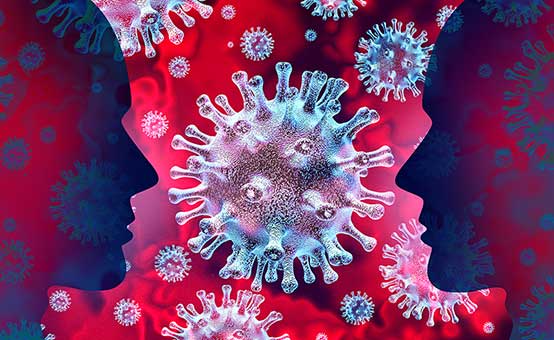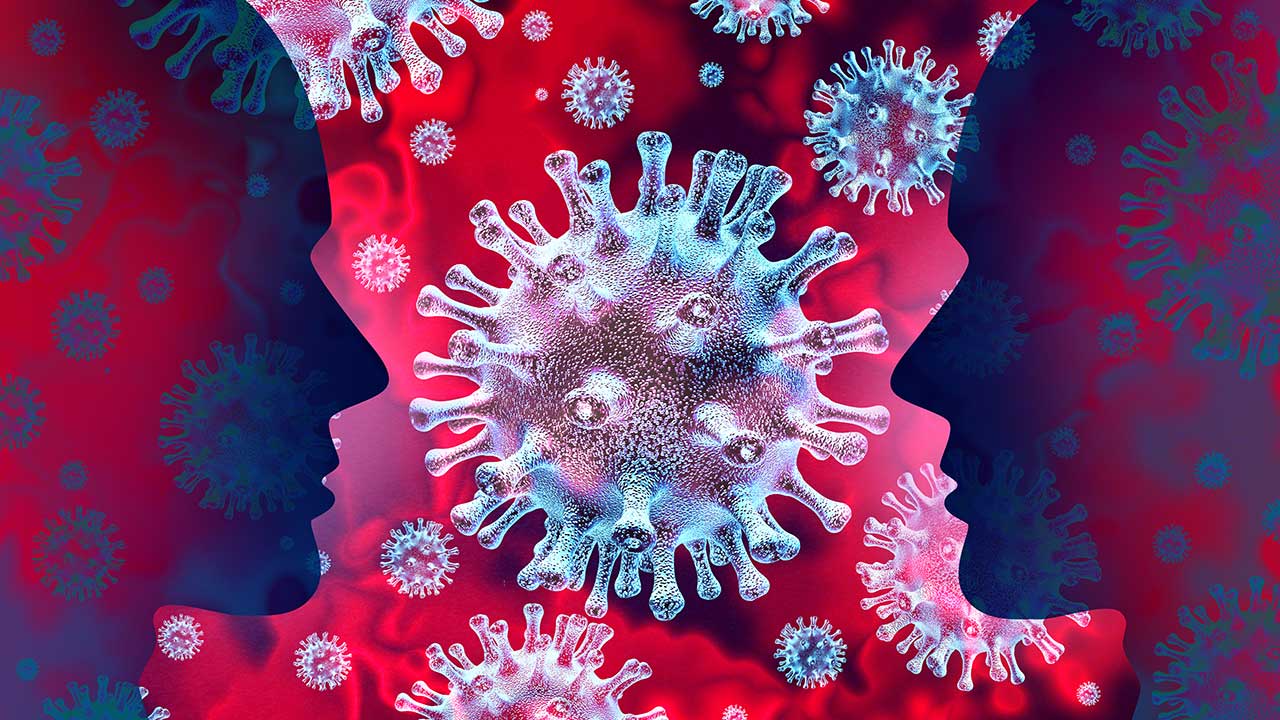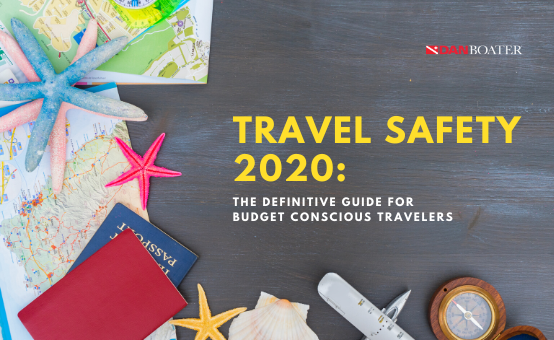

By James Chimiak, MD
TRAVEL HEALTH | JAN 25, 2020 [Final Update Mar 13, 2020]
Coronavirus has been in the press—and for good reason. Thousands of people in China have been affected. Nearly a dozen cities in China’s central Hubei province are facing travel restrictions. Lunar New Year celebrations have been canceled to reign in the spread of the virus. And many public venues (McDonald's) and Chinese tourist attractions (Shanghai Disney Resort, Great Wall of China) have been closed.
What about the U.S.? One man in Seattle has been confirmed with the infection, and a second case involving a 60-year old female Chicago resident who had traveled from Wuhan province earlier this month was identified by the CDC on Friday (Jan 24). A third suspected case is being investigated in Brazos County, Texas, involving a Texas A&M University student who recently traveled to Texas from Wuhan China.
Coronavirus is of a family of viruses that has resulted in considerable mortality and morbidity over the years. It is named for the spikes that resemble a crown on the surface of the virus. Other coronaviruses of note include the Middle East Respiratory Syndrome (MERS) and the Severe Acute Respiratory Syndrome (SARS). They are zoonotic, meaning they reside in animal hosts and can spill over and become human infections under certain conditions. MERS was associated with civet cats and MERS from camels. Other coronaviruses have been found in other animals that do not affect humans.
This new strain of coronavirus is thought to have originated at a seafood market in the Chinese province of Hubei in Wuhan city (population 11 million), hence the name Dec 31. One must remember that most people will be infected by one of the less virulent coronaviruses in their lifetime and will have contacted the virus by another’s cough or sneeze, hand contact with infected surfaces, or a handshake, and then touching their eyes, nose, or mouth.
Symptoms are like most respiratory viral infections and include sore throat, fever, headache, runny nose, fatigue, and malaise. Laboratory tests are available for suspected cases.
Treatment is supportive. Infections that result in pneumonia are most troubling, as well as those involving the extremes of age and the immunocompromised.
There are no immunizations for Coronavirus currently available.
The World Health Organization (WHO) has already begun monitoring to identify the spread of the virus and has published information on how to prepare for the virus with instruction for monitoring, treatment, and control. Recommendations to prevent its spread are like most respiratory infections. They include:
Anyone with symptoms should avoid contact with others (stay home if ill). Thoroughly cooking meat and eggs has also been suggested.
[Update 02/03/2020] The CDC and WHO confirmed last week that individuals carrying this strain of coronavirus -- even those without symptoms -- are contagious during the incubation period (2 to 14 days). The discovery has led health officials to recommend these additional precautions:
Video Source: World Health Organization (YouTube)
“Although the World Health Organization has not yet declared a global health emergency, with 630 infected and 18 dead in China, the CDC now warns of non-essential travel to Hubei Province, China, including Wuhan, where the outbreak is thought to have begun,” reports DAN Medical Director, Jim Chimak, M.D. “Transportation systems have been shut down in Wuhan and neighboring Huanggang.”
No matter where you’re traveling, be prepared to change travel plans, as individual countries may impose travel bans and restrictions as the situation changes, adds Dr. Chimak. “Screening at major airports such as Chicago, New York, San Francisco, Atlanta, and Los Angeles have begun, but no travel restrictions have been issued. Malaysia, Vietnam, Japan, Thailand, and Korea have reported cases linked to visitors returning from Wuhan city. And the one confirmed case in the US has been reported with a similar travel history that resulted in quarantine and subsequent recovery.”
[Update 02/03/2020] Many commercial airlines have halted some or all flights into and out of China. Individuals who do travel from China should expect to be quarantined for observation for up to 14 days upon entry to the United States. Other countries have imposed similar restrictions, as well.
If traveling abroad, DAN Senior Research Director Dr. Peter Denoble, offers these safety tips:
Case numbers continue to change as the outbreak evolves. To keep up with the latest totals both inside and outside of China, check Johns Hopkins' Coronavirus COVID-19 Global Cases dashboard.
Video Source: World Health Organization (YouTube)
[FINAL UPDATE 3/13/2020] COVID-19 continues to dominate the news as the infection spreads around the world, including here in the United States. Earlier this week, WHO officially classified the outbreak of this novel coronavirus as a global pandemic, spurring government officials to broaden travel restrictions to include Europe and health officials to strengthen advisories against non-essential travel and attendance at large events.
As the situation continues to develop at such a rapid pace, DAN Boater will no longer publish updates on this page. Instead, we encourage you to check the CDC, Travel.State.Gov, and WHO websites and social media channels regularly to ensure you have the latest, most authoritative information.
For now, take a moment to review the precautions advocated by DAN Boater and every health authority throughout the outbreak -- the triple Hs:
Hygiene - Do not eat, drink, or touch your face before washing your hands carefully. Your hands encounter bacteria and viruses every day, and each time you touch your face you risk infection by introducing these germs through your eyes, nose, and mouth.
Home - If you feel sick, stay home and recover. Home is where you can focus on getting well and improving your health. Staying at home also decreases the chance of spreading the disease to your friends, co-workers, and others in your community.
Health - Optimizing your health improves your body’s defenses.
You can do this by getting adequate sleep, reducing your stress, staying hydrated, following a healthy diet, and getting a moderate amount of exercise (if you're healthy). These measures are crucial for all your organ systems, especially your immune system which needs to be in top condition for both preventing illness and fighting it when you're sick.
Also, ask your doctor about the annual flu and pneumonia vaccines. This is a good time to get caught up.
Now is not the time to be run down. So think of your health preparation as you would if you were preparing for an upcoming athletic competition. It's especially important against any impending epidemic whether it be flu or COVID-19.
[UPDATE 2/27/2020] Re-enabled the Coronavirus COVID-19 Global Cases Dashboard. Added WHO's "What can people do to protect themselves and others from getting the new coronavirus?" video to the Protection and Prevention section.
[UPDATE 2/24/2020] Researchers have reported a case of novel coronavirus transmission by an asymptomatic individual from Wuhan, China. As of today, there are over 79,500 reported cases of COVID-19 worldwide, with 53 confirmed cases in the U.S. including 39 infected U.S. passengers repatriated from the Diamond Princess cruise ship. The CDC has now advised enhanced precautions if traveling to South Korea and Japan, and new cases are under investigation in Italy and Iran. According to this report from Reuters, the virus has spread to 29 countries and territories outside mainland China. The U.S. State Department has recommended reconsideration of cruise ship travel to or within Asia.
Johns Hopkins University announced this afternoon that its COVID-19 Dashboard went "down due to high traffic". They are working to get the application back online as quickly as possible.
In the meantime, stay up-to-date with the latest COVID-19 news and advisories from the CDC, WHO and U.S. Department of State right here.
[UPDATE 2/14/2020] The CDC continues to monitor the outbreak of the coronavirus (now known as COVID-19) in the United States. To date, 443 people have been tested in the U.S.: 15 have tested positive, 347 have tested negative, and 81 tests are pending. Visit the CDC's new Coronavirus Disease 2019 (COVID-19) in the U.S. page to see the latest map of U.S. states with confirmed COVID-19 cases.
[UPDATE 2/11/2020] The CDC confirmed a 13th case of coronavirus in the U.S. yesterday. The patient, located in California, had been under federal quarantine after returning from Wuhan, China recently. It is important to note that of the 13 known cases here in the U.S., 3 have already recovered from the virus.
The total number of confirmed cases worldwide as of yesterday is 43,138. Nearly 99% of these cases are still based in mainland China.
The CDC began shipping newly-developed novel coronavirus (2019-nCoV) test kits to select U.S. and international laboratories last week for distribution worldwide.
We will continue to monitor the latest news and advisories on the virus and provide updates on new prevention and treatment advice as soon as they become available.
[UPDATE 2/4/2020] The total number of confirmed coronaviruses cases worldwide climbed to 20,704 as of mid-day today with the majority (over 98%) in mainland China.
[UPDATE 2/3/2020] WHO has declared the novel coronavirus outbreak a public health emergency of international concern, prompting a number of countries, including the United States, to begin evacuating their citizens. The U.S. Department of State issued a Level 4 travel advisory for China. And health officials in California have confirmed three more cases of the virus in that state, bringing the total number of confirmed cases in the United State to 11. As of this morning, the total number of confirmed cases worldwide has exceeded 17,000. Find out what you can do to help protect yourself against the virus here.
[UPDATE 2/1/2020] CDC officials on Saturday confirmed an eighth case of the new coronavirus in the United States, this one in Massachusetts. The global case count is now just over 12,000, with the majority occurring in China. Follow the details on this case, and the California case announced yesterday, below.
[UPDATE 1/29/2020] WHO introduced a new 2019-nCoV outbreak category to its website yesterday. To help keep you up-to-date, we have incorporated the new reports and information from that category into our Advisories and Updates news stream below. We also updated our Locations with Confirmed Cases section to include a link to Johns Hopkins University's Wuhan Coronavirus Dashboard.
[UPDATE 1/27/2020] The director of China's National Health Commission said on Sunday that the incubation period for the novel coronavirus (2019-nCoV) is roughly 10–14 days — and the virus can be transmitted during that time, before symptoms appear. A U.S. infectious diseases expert said this means “the infection is much more contagious than we originally thought,” the New York Times reports.
In other coronavirus news, as of Sunday (1/26/2020):
[UPDATE 1/26/2020] This story has continued to develop rapidly, with the CDC confirming 5 cases of the Coronavirus in the United States as of today. To obtain the latest advisories and news, check the Latest News section below.
About James Chimiak, MD
Dr. Chimiak is the Medical Director at DAN where he oversees the organization's emergency management and medical operations. A former U.S. Navy Special Operations, Surface Warfare and Deep Sea Diver, he is also a triple board-certified physician in hyperbaric medicine, anesthesiology, and chronic pain.
MORE FROM
SAFE PASSAGE

TRAVEL SAFETY | Jan 12, 2020
Travel Safety 2020: The Definitive Guide for Budget Conscious Travelers

TRAVEL HEALTH | Dec 26, 2019
Travelers Beware: Leptospirosis in Humans is on the Rise
THIS WEBSITE DOES NOT PROVIDE MEDICAL OR DENTAL ADVICE.
It is intended for general informational purposes only and does not address individual circumstances. It is not a substitute for professional medical or dental advice, diagnosis or treatment and should not be relied on to make decisions about your health. Never ignore professional medical or dental advice in seeking treatment because of something you have read on the DAN Boater website. If you think you may have a medical emergency, immediately call your doctor, dial 911, or contact emergency services nearest you.